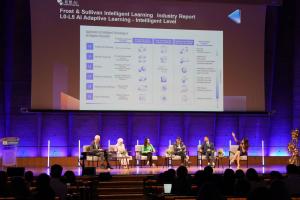Dr. Joleen Liang of Squirrel Ai Speaks at UNESCO, Showcasing China’s AI-Powered Education Practices
LOS ANGELES, CA, UNITED STATES, September 19, 2025 /EINPresswire.com/ -- From September 2–5, 2025, the UNESCO Digital Learning Week was held at UNESCO Headquarters in Paris, bringing together education ministers, senior policymakers, scholars, and industry leaders from over 50 countries. This flagship event in the global education technology field focused on the deep integration of AI and education, discussing key pathways for digital transformation worldwide. Dr. Joleen Liang, Co-Founder of Squirrel Ai, was invited to participate.
On September 3, during the plenary session “New Worlds of Learning: How Is AI Reshaping the Learning Futures of Students?”, Dr. Liang joined Mr. Andreas Schleicher (Director for Education and Skills, OECD), H.E. Fadhlina Sidek (Minister of Education, Malaysia), H.E. Shri Mahipal Dhanda (Minister of Education, Government of Haryana, India), and Mr. Geoffrey Alphonso (CEO, Alef Education, UAE) in an in-depth dialogue on how AI is transforming students’ learning futures. She shared concrete practices from China’s AI-in-education sector, highlighting Squirrel Ai’s innovations in integrating human care and cultivating student agency—underscoring the growing global influence of Chinese edtech enterprises.
During the plenary, UNESCO posed a critical question to Dr. Liang: how can AI tools respect the deeply human and relational dimensions of learning, amid concerns of education becoming overly mechanized? In response, Dr. Liang emphasized Squirrel Ai’s “AI + Human Mentorship” hybrid model, which seeks collaboration between technology and human touch rather than replacement.
She explained that Squirrel Ai’s platform never aims for “pure AI self-learning.” Instead, AI handles repetitive tasks such as knowledge-point diagnosis and basic practice assignment, while dedicated supervisors and data analysts provide emotional support and interpret learning data. For students experiencing anxiety due to weak foundations, mentors use AI-generated reports to pinpoint gaps and apply psychological methods to rebuild confidence. This model allows students to directly experience human–AI collaboration, fostering a mindset prepared for a future of human–AI symbiosis.
To further nurture the “human dimension,” Squirrel Ai enriches interaction through multimodal communication systems—text, voice, and animation—catering to diverse learning styles. The biannual “Squirrel Cup” National Championship encourages teamwork, collaboration, and communication, enabling students to practice social skills while engaging in problem-solving and competition.
Dr. Liang also highlighted Squirrel Ai’s independently developed MCM (Model of thinking, Capacity, and Methodology), which systematically trains higher-order skills—critical thinking, creativity, logical reasoning, comprehensive analysis, and communication—alongside academic knowledge. She candidly acknowledged that AI cannot fully replace human interaction, stressing that future work will focus on using AI agents as a “communication practice springboard” to help introverted students build confidence before engaging in real-world conversations.
In response to UNESCO’s core question on student transformative agency, Dr. Liang introduced the concept of “L5-Level Autonomous Learning”, likening it to Level 5 autonomous driving—where students achieve 100% self-directed, self-motivated learning. This vision is powered by Squirrel Ai’s cutting-edge technology.
She explained that Squirrel Ai’s core engine is neither a simple adaptive system nor a standard large language model (LLM), but a proprietary multimodal adaptive education model capable of dynamically tracking student learning states across the entire K–12 spectrum. Its root-cause tracing algorithm pinpoints the exact source of knowledge gaps—e.g., identifying that a middle school student’s geometry struggles originate from missing foundational concepts in elementary school—and builds a step-by-step path for mastery. Each small but meaningful success fuels student confidence, which then drives deeper engagement.
Another key enabler is micro-granular knowledge decomposition, which breaks subjects into the smallest learnable units. This prevents students from wasting time on what they already know or irrelevant topics, reducing frustration and increasing efficiency. With every problem solved precisely and efficiently, students gain a stronger sense of control over their own learning, which transforms passive participation into active engagement.
The platform’s multimodal AI tutor further personalizes the experience, offering near one-on-one interaction via voice-based guidance and bite-sized three-minute learning units that ensure quick comprehension and application. Instant feedback and short-term goal achievement give students a sense of accomplishment, shifting their mindset from “I have to learn” to “I want to learn.” Dr. Liang shared that long-term data shows significant improvements in student engagement, persistence, and independent planning skills—concrete evidence of enhanced transformative agency.
As the only Chinese edtech company invited to this session, Dr. Liang’s contributions highlighted both the technological depth and the educational values behind Squirrel Ai’s work. The company’s exploration provides a practical Chinese solution for AI-driven education, aligning with UNESCO’s vision of human-centered, technology-enabled learning. Moving forward, Squirrel Ai will continue to advance sustainable, algorithm-driven education practices—ensuring that technology truly serves the unique growth of every child and contributes to global education equity and quality.
James Huang
Squirrel Ai Learning
+86 137 0178 2210
email us here
Legal Disclaimer:
EIN Presswire provides this news content "as is" without warranty of any kind. We do not accept any responsibility or liability for the accuracy, content, images, videos, licenses, completeness, legality, or reliability of the information contained in this article. If you have any complaints or copyright issues related to this article, kindly contact the author above.





